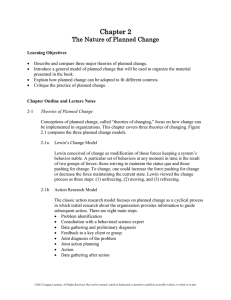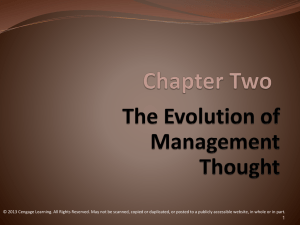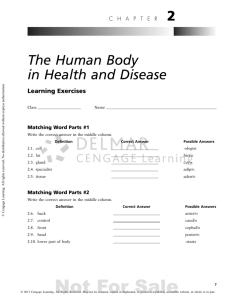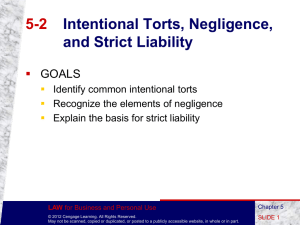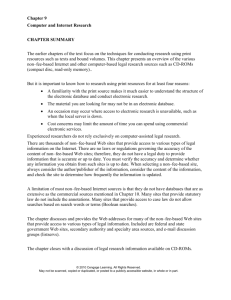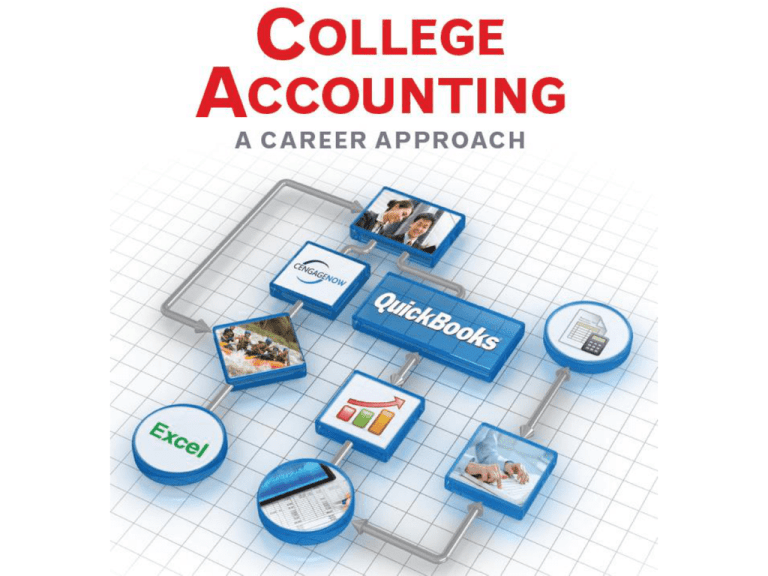
Chapter 12
FINANCIAL STATEMENTS,
CLOSING ENTRIES, AND
REVERSING ENTRIES
© 2015 Cengage Learning. All Rights Reserved. May not be scanned, copied or duplicated, or posted to a publicly accessible website, in whole or in part.
Whitewater
Raft Supply
© 2015 Cengage Learning. All Rights Reserved. May not be scanned, copied or duplicated, or posted to a publicly accessible website, in whole or in part.
Whitewater
Raft Supply
© 2015 Cengage Learning. All Rights Reserved. May not be scanned, copied or duplicated, or posted to a publicly accessible website, in whole or in part.
Learning Objective
© 2015 Cengage Learning. All Rights Reserved. May not be scanned, copied or duplicated, or posted to a publicly accessible website, in whole or in part.
_____________________
• Each of the amounts that appear in the _________
_________ columns of the work sheet will be used in
the _________ _________ .
• The basic format of an _________ _________ :
© 2015 Cengage Learning. All Rights Reserved. May not be scanned, copied or duplicated, or posted to a publicly accessible website, in whole or in part.
Gross Profit - Net Profit
Several years ago, Della Reyes bought an antique table at a
second-hand store for $800. She sold the table for $1,850. She
advertised in the daily newspaper at a cost of $73. How much
did she clear as profit?
_____________ is the ______ on the
sale of the table _____________
_______________. In this example,
_____________ is $_______.
_________ or _________,
it is word
____
thatisrefers
to clear
Net Income
or Net
Profit
the final
profit. In single-sale situations
thisallexample),
or clear(such
profit as
after
operatingthe final
outcome is _________.
In large
business
with manyInsales
expenses
have
been deducted.
this and
expenses, it isexample,
referredthe
to as
net_________.
profit is $977
© 2015 Cengage Learning. All Rights Reserved. May not be scanned, copied or duplicated, or posted to a publicly accessible website, in whole or in part.
_____________________
• __________________________ and __________
_____________ are deducted from Sales to give us
_____________ .
• Note that we record these items in the ______ ______
in which they appear in the ledger.
© 2015 Cengage Learning. All Rights Reserved. May not be scanned, copied or duplicated, or posted to a publicly accessible website, in whole or in part.
Ratio Analysis
An important function of accounting is to provide tools for
interpreting the financial statement or the results of
operations. One frequently used to analyze financial
statements is _______________________________ .
© 2015 Cengage Learning. All Rights Reserved. May not be scanned, copied or duplicated, or posted to a publicly accessible website, in whole or in part.
_____________________
Net Sales is the
100% row
© 2015 Cengage Learning. All Rights Reserved. May not be scanned, copied or duplicated, or posted to a publicly accessible website, in whole or in part.
© 2015 Cengage Learning. All Rights Reserved. May not be scanned, copied or duplicated, or posted to a publicly accessible website, in whole or in part.
© 2015 Cengage Learning. All Rights Reserved. May not be scanned, copied or duplicated, or posted to a publicly accessible website, in whole or in part.
_____________________
• The section of the income statement that requires the
greatest amount of concentration is the ___________
__________________ section.
© 2015 Cengage Learning. All Rights Reserved. May not be scanned, copied or duplicated, or posted to a publicly accessible website, in whole or in part.
Delivered Cost of Purchases
• First, let’s look closely at the Purchases section.
• To arrive at ________________, we deduct the sum of
________________________ and _________
_________ from _________. Then we add _________ to
get ________________________.
© 2015 Cengage Learning. All Rights Reserved. May not be scanned, copied or duplicated, or posted to a publicly accessible website, in whole or in part.
Cost of Goods Sold
You might think of Cost of Goods Sold like this:
Here’s the same Cost of Goods Sold expressed in proper wording:
© 2015 Cengage Learning. All Rights Reserved. May not be scanned, copied or duplicated, or posted to a publicly accessible website, in whole or in part.
Income from Operations
© 2015 Cengage Learning. All Rights Reserved. May not be scanned, copied or duplicated, or posted to a publicly accessible website, in whole or in part.
__________ Expenses
• __________________ are
any expenses directly
connected with the selling
activity, such as–
• ______________
• ______________
• ______________
• ______________
• ______________
• ______________
• __________________ are any
expenses related to the office or
administration, or any expense
that cannot be directly
connected with a selling activity:
• ______________
• ______________
• ______________
• ______________
• ______________
• ______________
© 2015 Cengage Learning. All Rights Reserved. May not be scanned, copied or duplicated, or posted to a publicly accessible website, in whole or in part.
Other Income and Other Expenses
• The Other ______
classification includes any
______ account other
than ______. Typical
accounts are as follows:
• ________________
• ________________
• ________________
• ________________
• The Other ______
classification includes
various __________
______ , such as–
• ______________
• ______________
© 2015 Cengage Learning. All Rights Reserved. May not be scanned, copied or duplicated, or posted to a publicly accessible website, in whole or in part.
The ________________________ and the
___________________
• Every figure in the __________ _________ columns
of the work sheet is used in either the _________ of
_________ _________ or the balance sheet.
• The _________ _________ is prepared first, followed
by the _________ __ _________ _________ ,
concluding with the _________ _________ .
© 2015 Cengage Learning. All Rights Reserved. May not be scanned, copied or duplicated, or posted to a publicly accessible website, in whole or in part.
The Statement of Owner’s Equity and the Balance Sheet
The balance of J. Conner, Capital listed on the worksheet…
…from the ledger there is
a credit of $9,000
representing an
additional investment.
From this the J.
Conner, Capital
beginning balance can
be calculated.
$253,774.00 – $9,000 = $244,774
© 2015 Cengage Learning. All Rights Reserved. May not be scanned, copied or duplicated, or posted to a publicly accessible website, in whole or in part.
Practice Exercise 1
© 2015 Cengage Learning. All Rights Reserved. May not be scanned, copied or duplicated, or posted to a publicly accessible website, in whole or in part.
© 2015 Cengage Learning. All Rights Reserved. May not be scanned, copied or duplicated, or posted to a publicly accessible website, in whole or in part.
12-22
© 2015 Cengage Learning. All Rights Reserved. May not be scanned, copied or duplicated, or posted to a publicly accessible website, in whole or in part.
Learning Objective
© 2015 Cengage Learning. All Rights Reserved. May not be scanned, copied or duplicated, or posted to a publicly accessible website, in whole or in part.
Current ________
Current _____ are listed in the order
of their ____________________, or
what is referred to as ________.
• ____________ consist of cash and any other assets or resources
•
•
that are expected to be realized in cash or to be sold or consumed
during the __________________________ (or one year, if the
normal operating cycle is less than twelve months).
• Examples of accounts that are current assets include
______, ________________, ________________, and
________________.
________________ (current) are short-term (one year or less)
promissory notes (promise-to-pay notes) held by the firm.
________________ and ______ are considered _______ items
that will be used or will expire with the following operating cycle or
one year.
© 2015 Cengage Learning. All Rights Reserved. May not be scanned, copied or duplicated, or posted to a publicly accessible website, in whole or in part.
Property and Equipment
• ________________ are relatively long-lived assets
that are held for use in the ___________ or ______ of
other _______________.
• Some accountants refer to them as _____________.
• Three accounts that usually appear in this category
•
are _____, ________, and ________.
_____ and ________are followed by their
respective _____________accounts.
Property and equipment assets are
listed in the ___________________,
with the _________ asset placed _____.
© 2015 Cengage Learning. All Rights Reserved. May not be scanned, copied or duplicated, or posted to a publicly accessible website, in whole or in part.
Current ____________
• Current ___________ are ______ that will become
due within the normal operating cycle of the business,
usually within one year.
• They normally will be paid, when due, from current
______ .
• Three accounts that usually appear in this category
are ______, ________________,
________________, and ________________.
Current liabilities are listed in the
__________________________.
© 2015 Cengage Learning. All Rights Reserved. May not be scanned, copied or duplicated, or posted to a publicly accessible website, in whole or in part.
____________ Liabilities
• ___________ Liabilities are debts that are payable
over a comparatively ______ period, usually ______
than one year.
The ______ portion of notes, contracts, and loans (______
due within the next year) is shown as a _____________ .
The remaining amount is shown as a _____________.
© 2015 Cengage Learning. All Rights Reserved. May not be scanned, copied or duplicated, or posted to a publicly accessible website, in whole or in part.
Practice Exercise 2
© 2015 Cengage Learning. All Rights Reserved. May not be scanned, copied or duplicated, or posted to a publicly accessible website, in whole or in part.
© 2015 Cengage Learning. All Rights Reserved. May not be scanned, copied or duplicated, or posted to a publicly accessible website, in whole or in part.
Learning Objective
© 2015 Cengage Learning. All Rights Reserved. May not be scanned, copied or duplicated, or posted to a publicly accessible website, in whole or in part.
__________ ___________
• _______________ is the amount of ______ a firm has
•
available to use or to work with during a ______
______ ______ (usually less than one year).
It is determined by ______ current ______ from
current ______ .
© 2015 Cengage Learning. All Rights Reserved. May not be scanned, copied or duplicated, or posted to a publicly accessible website, in whole or in part.
___________ ___________
• The ______________ is useful in revealing a firm’s
ability to pay its bills.
• It is determined by ______ current ______ by current
______ .
© 2015 Cengage Learning. All Rights Reserved. May not be scanned, copied or duplicated, or posted to a publicly accessible website, in whole or in part.
Whitewater Raft Supply: Working Capital
and Current Ratio
In the case of Whitewater Raft
Supply, they have $_____ in
current _____ available to pay
_____ dollar currently _____ on
December 31.
© 2015 Cengage Learning. All Rights Reserved. May not be scanned, copied or duplicated, or posted to a publicly accessible website, in whole or in part.
Practice Exercise 3
© 2015 Cengage Learning. All Rights Reserved. May not be scanned, copied or duplicated, or posted to a publicly accessible website, in whole or in part.
Learning Objective
© 2015 Cengage Learning. All Rights Reserved. May not be scanned, copied or duplicated, or posted to a publicly accessible website, in whole or in part.
_________________
• At the end of the fiscal period, you close the
_________ and _________ accounts so that you can
start the next fiscal period with _______ balances.
• You close the _________ account because it, too,
•
applies to one fiscal period.
Recall that these accounts are called _________
_________ accounts, or _________ .
© 2015 Cengage Learning. All Rights Reserved. May not be scanned, copied or duplicated, or posted to a publicly accessible website, in whole or in part.
Four Steps in the Closing Procedure
Note that ______________________ and
______________________ are closed
along with the _______ accounts.
© 2015 Cengage Learning. All Rights Reserved. May not be scanned, copied or duplicated, or posted to a publicly accessible website, in whole or in part.
Four Steps in the Closing Procedure
Note that ______
______ and ______
________________
are closed along
with the ______
accounts.
© 2015 Cengage Learning. All Rights Reserved. May not be scanned, copied or duplicated, or posted to a publicly accessible website, in whole or in part.
Four Steps in the Closing Procedure
© 2015 Cengage Learning. All Rights Reserved. May not be scanned, copied or duplicated, or posted to a publicly accessible website, in whole or in part.
Four Steps in the Closing Procedure
© 2015 Cengage Learning. All Rights Reserved. May not be scanned, copied or duplicated, or posted to a publicly accessible website, in whole or in part.
Practice Exercise 4
© 2015 Cengage Learning. All Rights Reserved. May not be scanned, copied or duplicated, or posted to a publicly accessible website, in whole or in part.
© 2015 Cengage Learning. All Rights Reserved. May not be scanned, copied or duplicated, or posted to a publicly accessible website, in whole or in part.
© 2015 Cengage Learning. All Rights Reserved. May not be scanned, copied or duplicated, or posted to a publicly accessible website, in whole or in part.
© 2015 Cengage Learning. All Rights Reserved. May not be scanned, copied or duplicated, or posted to a publicly accessible website, in whole or in part.
Learning Objective
© 2015 Cengage Learning. All Rights Reserved. May not be scanned, copied or duplicated, or posted to a publicly accessible website, in whole or in part.
_____________ Entries
• ________________________ are general journal
entries that are the _____ _____ of certain adjusting
entries.
• A reversing entry enables the accountant to record
routine transactions in the usual manner, _______
______ an adjusting entry affecting one of the
accounts involved in the transaction has intervened.
© 2015 Cengage Learning. All Rights Reserved. May not be scanned, copied or duplicated, or posted to a publicly accessible website, in whole or in part.
Mason Company Example
Entries up to year-end
All the employees of Mason Company earn, altogether, $400 per day for a
five-day week and their payday occurs every Friday. Their current paychecks
include wages for that Friday and for the preceding four days. The last day of
the fiscal year falls on Wednesday, December 31.
© 2015 Cengage Learning. All Rights Reserved. May not be scanned, copied or duplicated, or posted to a publicly accessible website, in whole or in part.
Mason Company Example
Wages Expense
has a debit balance,
as of December
26th, of $102,000.
On December 31st, Wages Expense is credited for $103,200.
And, Wages Payable continues to have a credit balance of $1,200.
The $2,000 payroll on January 2 is allocated by debiting Wages
Payable for $1,200, debiting Wages Expense for $800, and crediting
Cash for $2,000
© 2015 Cengage Learning. All Rights Reserved. May not be scanned, copied or duplicated, or posted to a publicly accessible website, in whole or in part.
Mason Company Example
The following reversing entry is made on the first day
of the following fiscal period (which is an exact reverse
of the adjusting entry):
© 2015 Cengage Learning. All Rights Reserved. May not be scanned, copied or duplicated, or posted to a publicly accessible website, in whole or in part.
Mason Company Example
On the first payday
of the new fiscal
period, Wages
Expense is debited
while Cash is credit
for $2,000 (just as if
it was the middle of
the fiscal year). After
the payroll entry,
there will now be a
debit balance of
$800 in Wages
Expense, which is
the correct amount.
© 2015 Cengage Learning. All Rights Reserved. May not be scanned, copied or duplicated, or posted to a publicly accessible website, in whole or in part.
Mason Company Example
© 2015 Cengage Learning. All Rights Reserved. May not be scanned, copied or duplicated, or posted to a publicly accessible website, in whole or in part.
Reversing Entries
• If an adjusting entry is to be reversed, it must meet
BOTH of the following qualifications:
•
•
________________________________________
_____________________
________________________________________
_____________________
With the exception of the first year of operations,
Merchandise Inventory and contra accounts (such as
Accumulated Depreciation) always have previous
balances. Consequently, adjusting entries involving
these accounts should _____________ be reversed.
© 2015 Cengage Learning. All Rights Reserved. May not be scanned, copied or duplicated, or posted to a publicly accessible website, in whole or in part.
Practice Exercise 5
© 2015 Cengage Learning. All Rights Reserved. May not be scanned, copied or duplicated, or posted to a publicly accessible website, in whole or in part.
© 2015 Cengage Learning. All Rights Reserved. May not be scanned, copied or duplicated, or posted to a publicly accessible website, in whole or in part.
© 2015 Cengage Learning. All Rights Reserved. May not be scanned, copied or duplicated, or posted to a publicly accessible website, in whole or in part.



